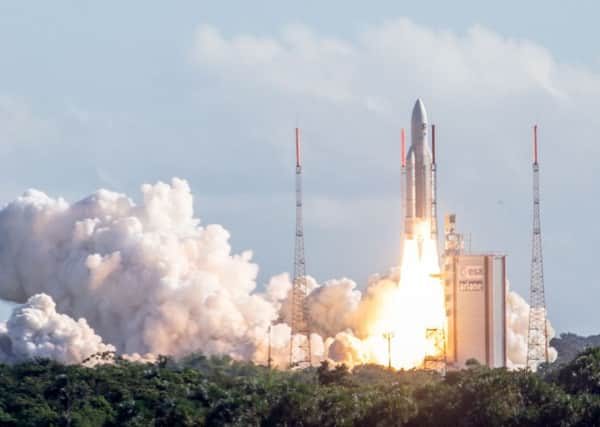Comment: Why the sky is the limit for Scotland’s space industry


“More satellites are built in Glasgow than any other city in the world,” said Malcolm Macdonald, Space Lead at the Scottish Centre of Excellence in Satellite Applications. Isn’t it interesting that the city famous for ship-building should now be leading the way with spaceships?
Where we once thought of space as putting a man on the moon, the industry is now much more focused on the data coming from satellites. Scotland is particularly well-placed to capitalise on this growing sector – with many agreeing a Great British Space Age is dawning.
Advertisement
Hide AdAdvertisement
Hide AdSince the Space Industry Act was passed in March, it has led to millions of pounds worth of funding being made available to companies looking to expand in the industry. Perhaps most excitingly, £31.5 million has been set aside for the development of a spaceport in the most northerly tip of Sutherland. Highlands and Islands Enterprise has begun gauging interest in designing, building and operating the port.
This would be the only launch facility in Europe – and has the potential to complete the circle of services already offered by the Scottish space industry.
“Launch is the one thing we cannot do in Scotland,” Malcolm explained. “Getting the satellites into orbit is the missing piece of the puzzle – the spaceport would give us full end-to-end capacity.”
The capacity includes not just the building of satellites, but also the software development and processing of the data they provide. In fact, these downstream services form 90 per cent of the global market.
Scotland’s universities are playing a key role in developing not only the talent, but the market. At Edinburgh University, Dr Murray Collins is the Chancellors Fellow in Data Innovation: Space and Satellite analysis. Working through the Bayes Centre, Murray’s role is to develop new research and partnerships with industry and public sector to increase the uptake of data-driven innovation.
“Organisations that don’t embrace this technology generally will be left behind,” he said. “What’s really exciting right now in the space sector is the fact, at the same time as huge volumes of data have become freely available from satellites, the technology to process, analyse and distribute that data is developing rapidly.”
Murray’s work so far has focused on data analytics to detect deforestation and map landscapes, but increasingly companies are keen to use the data to monitor crop yields and pollution.
The environment is supportive – Edinburgh’s £1.3bn City Deal, of which Murray’s role is a part, aims to train 100,000 data scientists and foster 400 data-enabled start-up companies in the next 15 years, and funding is forthcoming from the UK Space Agency (UKSA).
Advertisement
Hide AdAdvertisement
Hide AdChris Lee, UKSA chief scientist, said Scotland has always focused on the development of technology and demonstrating utility. He said: “We’re seeing a change in the nature of what we mean by ‘space’. Scotland is developing a very strong ecosystem around applications. The opportunity for growth is there.”
Everyone I’ve spoken to in this rapidly developing industry agrees that the goal is for inclusive growth. A broad diversity of industries can benefit from satellite data and Scotland is uniquely placed to capitalise on this opportunity.
From the cutting edge satellites being built by businesses like Clyde Space and Alba Orbital in Glasgow to the big data processing happening in companies like Ecometrica, LTS and Astrosat in Edinburgh, the expertise and technology is impressive for a nation of five million.
UKSA’s ambition is to address 10 per cent of the global market by 2030 – that’s worth £40bn to the UK. Translate that to the economic opportunity for Scotland, where, according to the Space Sector Report 2017, one-fifth of the workforce resides, and we have the potential to attract £2.5bn.
There’s no doubt this is a time of transition for the space industry. We are in a perfect storm of freely available data, sophisticated software to translate it and the expertise to apply it – all while satellites are moving increasingly from public into private ownership.
Dr Graham Turnock, chief executive of the UKSA, told me Scotland has a strong heritage in the space sector. “Earlier this year we announced more than £30m of funding to support a spaceport in Sutherland which will build on the country’s global reputation for manufacturing small satellites,” he said.
“In addition, Scotland will benefit from a £2m government fund to help horizontal launch sites such as Glasgow and Prestwick grow their sub-orbital flight, satellite launch and spaceplane ambitions which could attract companies from all over the world to invest in the region.”
As Brexit uncertainty affects us all, perhaps we should be broadening our horizons and aiming for the stars.